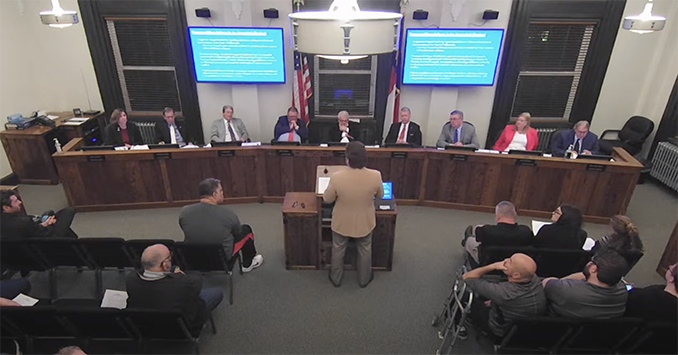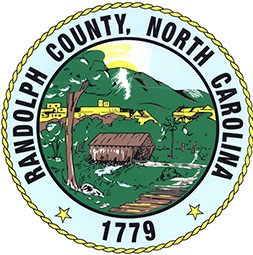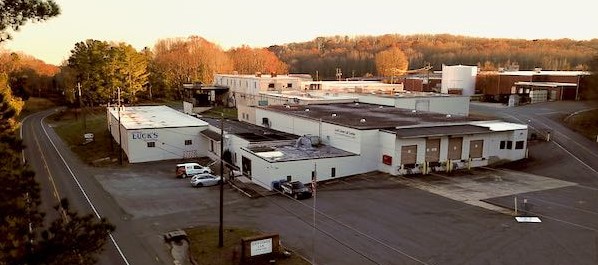ASHEBORO — The Asheboro city council met Thursday with a handful of public hearings on the agenda.
The council approved an amendment to the Zoo City Social District to slightly expand the map and to also make certain clarifications in specific regulations.
“What we are doing here is tweaking the boundaries of the social district just slightly to include possibly as many as four new businesses that want to be included in the social district,” said Mayor David Smith. “We are just trying to get our ordinance in line with what the state expects in addition to adding just a couple of little areas to this blueprint.”
The amendments in relation to the Zoo City Social District also includes further clarification of specific definitions, regulations, and allowances.
All of the ordinance provisions will take effect on February 1.
The council also approved the closure of a portion of West Pritchard Street that had already been barricaded off.
The council then approved various text amendments that had been submitted for the purpose of updating a broad range of subdivision review/approval regulations.
“The topics include the review/approval/appeal variance process, a number of technical standards to subdivision regulations, as well as approval expiration time frames for major residential subdivision development,” said Community Development Director Trevor Nuttall.
Text amendments included granting the city council sole authority to issue variances or requests to deviate, changing the formal approval authority for subdivisions from city council to Community Development staff, and adding expiration guidelines for subdivision sketch design plants.
In addition, it also included extending expiration durations for preliminary plats, changing plat certification language and dimensional requirements to improve the accuracy of certification language and reflect changes to the criteria established by state law and the register of deeds office for recording plats, clarification on street lighting responsibilities within new major subdivisions, and establishing private street design standards for larger planned unit developments and other minor changes.
“For the last two or three years, we’ve sat here many nights debating subdivision proposals, what was in the best interest of the future of Asheboro, and what we wanted Asheboro to look like, and this is a big step in the right direction,” Smith said on the amendments.
The council then held three legislative hearings.
The first was a request to rezone property at 564 Cox Avenue.
“This is a request from the property owner to take property from a conditional commercial zoning district to R10, medium density residential district,” Nuttall said. “We’re looking at one Randolph County pin with this request, and it’s one-third of an acre in size. Currently, there is a single-family dwelling on the property that is being used as a dwelling, and the property is being used residentially. That does constitute a legal, non-conforming use. The conditional zoning that is on the property is from 2007. It was intended to allow professional services as well as business services and personal services with some exclusions as part of that approval. With a conditional zoning B2 district, any additions or improvements to the structure for residential use are very much restricted because that is not a use that is recognized as permitted in the district. In order to make any sort of improvement to the property for residential use, a rezoning is necessary.”
Following the hearing, the council approved the rezoning request.
The second request was to rezone property located on Golda Avenue, east of 210 Golda Avenue, approximately 850 feet east of the intersection of North Fayetteville Street from R10 to RA6 (CZ), for a development with multiple family dwelling units.
The property is 8.5 acres of undeveloped land, and the developer wanted to build 45 units on it.
However, due to concerns over the proposed density and, thereby, increasing traffic, the council voted to table the hearing until their next meeting, when they can get a more precise view of what the city can do to help with the issues brought up by the public on Goldoa Avenue.
“There are two important points to make here,” Smith said. “First of all, we desperately need the housing. Secondly, it is incumbent upon us as a city council, because that is a city street, to improve that access to accommodate whatever is needed for that neighborhood. If we were to move forward next month and approve this neighborhood, then we will try to have a plan in place to address that traffic problem.”
The final request was a preliminary plat review for the Cane Creek Townhomes subdivision.
“This is a request for a preliminary plat approval, or the second of three approvals for the city’s subdivision approval process,” Nuttall said. “We are looking at 3.67 acres. There are ten lots proposed as well as some common area and the average lot size is 2,500 square feet.”
Following the hearing, the council approved the preliminary plat.
The council approved the application for the NC Housing Finance Agency Urgent Repair Program.
“Under the program, assistance is provided in the form of an unsecured, deferred and forgivable, 0% loan to low and very low-income homeowners,” Nuttall said. “The loan must be used towards authorized and agreed upon home repairs that are necessary to keep the homeowner safe and or prevent displacement from the home due to dangerous living conditions. Eligible applicants must live in the city and reside at the property in need of the repairs. There are other qualifying characteristics in addition to the income limits that are designed to give this funding to the elderly, disabled, military veterans or female head-of-households.”
Nuttall stated that if they get funding from the program, he anticipates being able to repair at least 11 homes. Up to $11,000 in repairs would be available, forgiven at a rate of $3,000 per year till that principle is reduced to $0.”
The council also approved the retaining of an environmental lawyer to assist with concerns over the renewal of their permit to operate the wastewater plant and a 120-month lease, $2,990 per month, lease agreement with T-Mobile South, LLC for the placement of electronic communications equipment.
The Asheboro City Council will next meet February 9.



